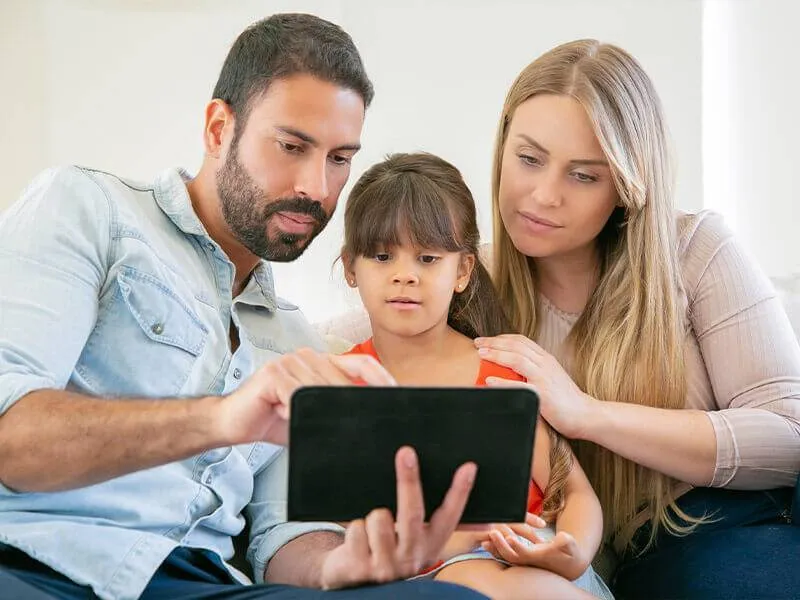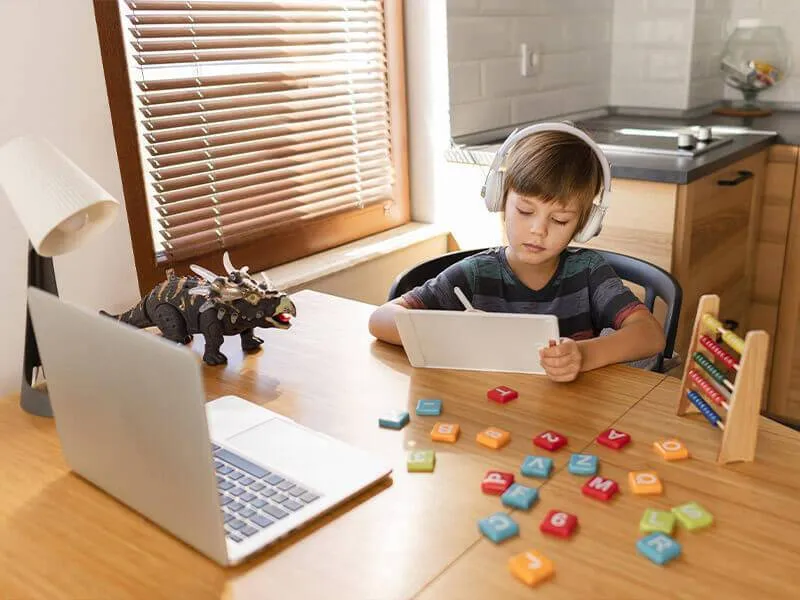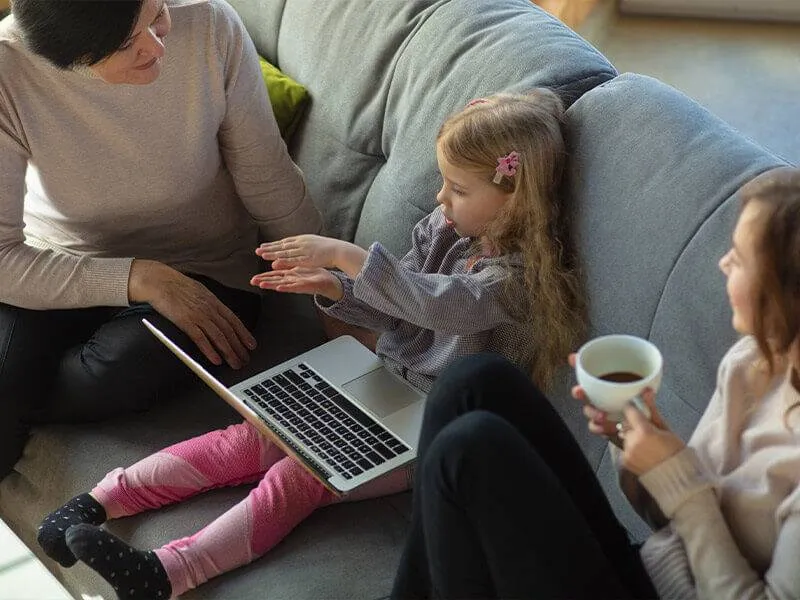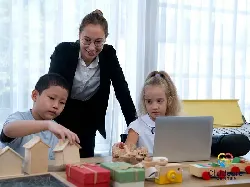Keeping Your Kids Safe Online: A Comprehensive Guide

The internet offers a wealth of opportunities for children to learn, explore, and connect with others. With instant access to information, educational resources, and social networks, the internet is a truly fascinating place for kids to spend their time. However, with this accessibility comes a host of potential dangers, from online predators and cyberbullying to exposure to inappropriate content. As a parent or caregiver, it's crucial to be proactive in ensuring the safety of your children while they navigate the digital world.
Education is key to ensuring internet safety for kids. Teach your children about the dangers of sharing personal information, such as their full name, address, and phone number, with strangers online.

Emphasize the importance of strong passwords, and encourage them to think twice before clicking on links or downloading files from unknown sources. It's also important to monitor your children's online activities, both to protect them from potential risks and to ensure that they are using the internet in a responsible and productive manner. Consider using parental controls to restrict access to inappropriate websites, or using monitoring software to track their online activities.
In addition to education and monitoring, setting clear rules and expectations for internet usage can also help keep kids safe online. Establish guidelines for the amount of time they can spend online, and restrict access to websites or apps that you consider harmful or inappropriate. In this article, we'll cover the best practices for keeping kids safe online and provide tips on how to navigate the digital world with confidence.
What Are Kids Doing Online?
In today's digital age, children are spending more and more time online, engaging in a wide range of activities that can include:
- Social Media: Children use social media platforms such as Facebook, Instagram, and Snapchat to connect with friends, share pictures and videos, and express their thoughts and feelings.
- Online Gaming: Online gaming has become one of the most popular activities among children, with many kids spending hours playing games with friends or competing against other players online.

- Video Streaming: Children watch and enjoy a variety of videos on platforms such as YouTube, including music videos, comedy skits, and gaming tutorials.
- Online Learning: With the shift to remote learning, many children are now participating in online classes and using educational websites and apps to supplement their education. To grasp the full scope of this transition, delve into 'Digital Learning Revolution: How Technology in Education is Changing the Game!' and discover the transformative role of tech in our classrooms.
- Shopping: Children are increasingly using the internet to shop for clothes, toys, and other items, making it important for parents to monitor their online spending habits and protect them from potential scams and fraud.

- Chatting and Instant Messaging: Children use messaging apps and chat rooms to communicate with friends, share information, and connect with others who share their interests.
- Online Research: Children use the internet to research and gather information on a wide range of topics, including school projects, hobbies, and interests.
By understanding what children are doing online, parents can take steps to ensure that they are safe and protected while they are online, and help them to make responsible and informed decisions about their online activities.
Educate Your Children about Internet Safety
Education is the foundation for Keeping Your Kids Safe Online. It’s crucial to teach them about the risks of sharing personal information and the importance of strong passwords. By doing so, we empower them to make informed and responsible decisions while exploring the internet.
It's also important to emphasize the significance of strong passwords, and why they should choose passwords that are difficult to guess or crack.
Explain that using simple passwords, such as their name or date of birth, puts them at risk of having their online accounts compromised. Teach them to use a combination of letters, numbers, and symbols in their passwords, and to never reuse passwords for multiple accounts.

Another key aspect of internet safety is to be wary of clicking on links or downloading files from unknown sources. Teach your children to think twice before clicking on a link or downloading a file, and explain why it's important to be cautious when it comes to online content.

Encourage them to only download files or click links from sources they trust, and to be extra careful when it comes to links or downloads that seem too good to be true. By educating your children about these important internet safety topics, you can equip them with the knowledge and tools they need to stay safe online. With your guidance and support, your children can confidently navigate the digital world and enjoy all the amazing opportunities it has to offer.
Explain the importance of privacy settings on social media, and show them how to adjust their settings to limit the information that is shared with others. Teach them to be cautious when accepting friend requests from people they don't know in real life, and to never share their location with strangers.
Monitor your child’s internet activity
Monitoring is a vital component in Keeping Your Kids Safe Online. Regularly overseeing your children's online activities and employing effective parental controls can shield them from online predators and other internet dangers, ensuring their secure and responsible internet use.
When setting up parental controls, consider using a combination of software and hardware solutions to provide the best protection for your children.
For example, you can use a parental control app on your children's smartphones and tablets, as well as setting up parental controls on your home internet router to monitor and control their internet usage on all devices connected to your home network.

Regularly updating your parental controls is also crucial to ensure that they remain effective in keeping your children safe online.

With technology constantly evolving, it's important to stay on top of the latest developments and to update your parental controls accordingly. By monitoring your children's online activities and setting up effective parental controls, you can help to protect them from online predators, cyberbullying, and other forms of online harm. This will give you peace of mind, knowing that your children are safe and secure while they explore and enjoy the online world.
Consider using a monitoring software that allows you to see what your children are doing online, including which websites they visit, who they communicate with, and what they share on social media. This can help you to identify potential risks and to take action to keep your children safe.

Establish Rules for Internet Usage
Keeping Your Kids Safe Online also involves setting clear and understandable rules for internet usage. These rules help in fostering responsible online behavior and good digital habits, preventing over-reliance on technology and exposure to harmful content.
It's important to communicate these rules clearly to your children and to make sure they understand the reasons behind them. For example, you can explain that limiting their time online helps them to avoid becoming addicted to technology or losing touch with real-life relationships and activities.
Involving your children in the process of setting these rules can also be beneficial. Encourage them to share their thoughts and opinions about internet usage, and work together to establish rules that are fair and realistic for everyone. By establishing rules for internet usage, you are providing a structure for your children's online activities and helping them to develop good habits and responsible behavior. This can be especially important in today's digital age, where technology plays such a central role in our lives and it's easy for children to get lost in the vast and often overwhelming world of the internet.

Discuss the rules with your children, and make sure that they understand why they are important. Consider using a tool to help you enforce the rules, such as a timer or a scheduling software that limits internet access.
Maintain honest and open communication
Maintaining an open and active dialogue with your children is essential to ensuring their safety and well-being online. By staying involved and asking questions, you can stay informed about their online experiences and be better equipped to address any potential risks or challenges. It's important to make time to talk to your children about their online activities and encourage them to share their thoughts and feelings with you.

Ask about the websites they visit, the apps they use, and the people they interact with online. This can help you to understand their online habits and behaviors, and to identify any potential issues or risks. While the digital world is full of opportunities for learning and entertainment, it’s also crucial to encourage a balanced lifestyle. Discussing and engaging in Best Indoor Games and Activities for Kids can be a wonderful way to divert their attention from screens and foster creativity, physical activity, and family bonding.

In addition to asking questions, it's also important to listen to your children's concerns and fears. By being a supportive and understanding parent, you can help to build trust and a strong relationship with your children, which can be invaluable in promoting their safety and well-being online.
Ultimately, staying involved and asking questions can help you to foster a positive and healthy online experience for your children. By being an engaged and informed parent, you can empower your children to navigate the digital world with confidence and stay safe and protected while they are online
By staying involved and asking questions, you'll be able to better understand your children's online world, and to help them navigate the digital world with confidence.
Tools for Keeping Your Kids Safe Online
In addition to educating your children about internet safety, monitoring their online activities, establishing rules for internet usage, and staying involved and asking questions, there are also several tools and resources available to help you keep your children safe online. Some of the most useful tools and resources include:
- Parental Control Software: Parental control software allows you to monitor and restrict your children's internet usage. These tools can be used to block inappropriate websites and content, set time limits for internet usage, and monitor your children's online activities.
- Web Filters: Web filters can be used to restrict access to inappropriate websites and content, and to help protect your children from potential dangers such as cyberbullying, online predators, and exposure to adult content.

3. Monitoring Apps: Monitoring apps can be used to track your children's online activity and provide you with detailed reports on their internet usage, including the websites they visit, the apps they use, and the people they interact with online.

- Password Managers: Password managers can help your children to create and manage strong, unique passwords for all of their online accounts, and can help to protect them from password-related threats such as hacking and phishing.
- Online Safety Resources: There are numerous online safety resources available, including websites, articles, and guides that provide information and advice on how to keep your children safe online.
By using a combination of these tools and resources, you can help to ensure that your children are protected and safe while they are online, and empower them to navigate the digital world with confidence.
What to do If your child is the bully?
If you discover that your child is bullying others online, it is important to take immediate action to address the behavior and help your child understand the impact of their actions. Here are some steps you can take:
- Open a dialogue: Start by having a calm and non-judgmental conversation with your child about the bullying behavior, and listen to their perspective.
- Explain the harm: Explain to your child the serious impact that bullying can have on others, and help them understand how their actions are hurting others.
- Emphasize empathy: Encourage your child to put themselves in the shoes of the person they are bullying, and to understand how it feels to be on the receiving end of such behavior.

- Encourage them to make amends: Help your child to understand the importance of apologizing and making amends for their actions, and support them in doing so if appropriate.
- Establish consequences: Make it clear that there will be consequences for their actions, such as loss of internet privileges, community service, or seeking professional help.
- Reinforce positive behaviors: Encourage your child to engage in positive online behavior, such as being kind and respectful to others, and reward them for doing so.
- Seek help: Consider seeking the help of a professional, such as a counselor or therapist, if your child's behavior persists or if you need support in addressing the issue.
Remember, it is important to approach the situation with compassion and to work together with your child to address their behavior and help them make positive changes.
Online safety for children is a top priority for parents and caregivers in today's digital landscape. The Canadian Centre for Child Protection is a leading organization that provides resources and tools to help keep kids safe online. Their website, offers a range of resources on topics such as cyberbullying, online exploitation, and digital literacy. With the centre's support, families can navigate the digital world with confidence and peace of mind. Visit the Canadian Centre for Child Protection to learn more about online safety for kids.
Conclusion
Keeping Your Kids Safe Online is a multifaceted approach involving education, monitoring, clear rule-setting, and open communication. By implementing these strategies, parents can create a secure online environment, allowing children to explore, learn, and connect safely on the internet.








